I’m pretty sure that in the common sense programmers are considered rational folks, their minds solidly rooted in facts, comforted by engineering, based on logic, algebra and maths. Brains like knife part truth from lies, dispel doubts and myths.
Well, maybe. What is true is that those who write programs for passion before than for a living, proud themselves to be artists (or at least craftsmen). Artists have inspirations and base their work on inner emotions and use rationality just as a tool when they need it and irrationality as the tool for the other times.
We, programmers, can write code that with is capable to insert a spacecraft in Pluto orbit with astounding precision, while, at the same time we can decide to quit a job if forced to use some tool or process we don’t like.
I tried to be as rational as possible in choosing my tools, programming habits and process, always trying to justify in terms of engineering practice, sometimes changing my gut choice. Recently I confronted with, or, maybe better, have been challenged by colleagues and friends on these matters and long and heated discussions arose.
So I decided to prepare a short poll via surveymokey (even shorter because of the limit for free survey), on the issues that more closely seem to be matter of religion and faith among my friends. Here I’m presenting the result.
As of today I have received 24 poll submission, the poll is still open so feel free to take it, if the exit poll would change significantly in the future I’ll update my analysis. I won’t claim any statistical validity, it is just a poll among friends, likely a very biased set of programmers.
Preferred Text Editor
This is one of the most ancient religion war among programmers, dating well before the advent of PC
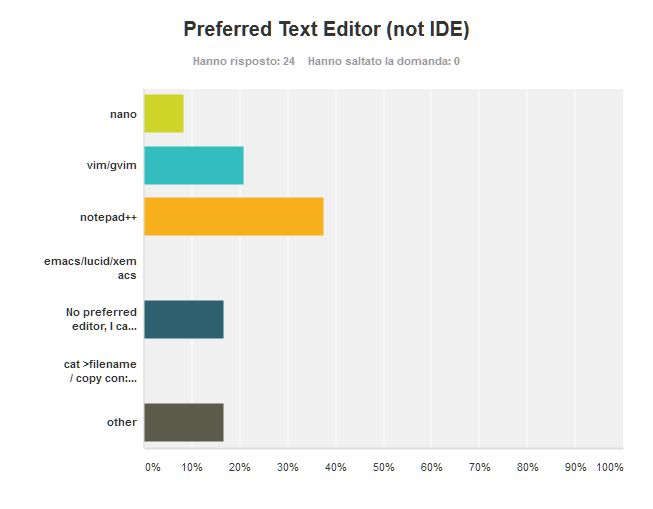
I find interesting that set aside the Windows editor notepad, vim/gvim comes second, winning even over nano which is the other Linux/Unix standard. Emacs seems much dead, which is somewhat surprising when compared to vim. In the other votes I count one and half for Sublime Text, half vote for Atom (which I don’t know), 1/3 vote for notepad++ and two misvotes (I requested no IDE).
My editor of choice is usually vim/gvim, but when I’m on Windows I often and often go for Notepad++. The vim choice was not a straight one because vim is hard to learn. At the beginning, when I used vt100 terminals at the university, I hated it. It appeared like a cumbersome relic from a long gone era. At home I could interactively use CygnusEd on Amiga. But at school we were prevented to use Emacs because the poor HP-UX box we used had just 16M RAM and Emacs made it crash on launch.
Then I came to terms with vi, but I never suggest anyone to learn it, even after I reached a fair proficiency. There are two main reasons that make vim my preferred editor. First it is available on every Unix machine. Maybe you find nano or pico or even emacs or none of them, it depends on the distribution, on the system. But vi, if not vim, is there for sure. Also consider that now linux is used also on embedded systems that are still resource constrained so chances are that you can’t install the editor you want. The second reason is that when you have a slow/intermittent (or blind) connection nothing beats vi. You count how many columns you want advance, how many characters you want to delete, where to insert and with a single command you instruct the editor to do what you want. Try to move the cursor 10 columns forward on an intermittent connection using a conventional editor by pressing repeatedly the right arrow key. Are you sure you pressed it ten times? And that the editor on the other side of the Moon received 10 keypresses? How confident you are? Well with vim you are sure of what you have done. On the other hand if you happen to have the wrong keyboard layout…
Indent Technique
Indentation is a need for readability in many programming language, in some it is even needed for proper compilation. There are two basic techniques whose origin is lost in the dawn of electrical typewriters – spaces and tabs.
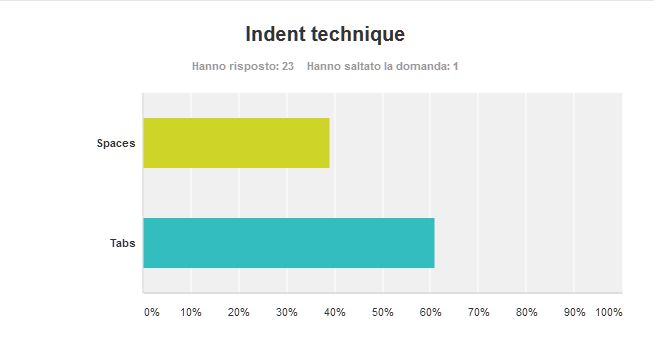
The advantage of tabs is that you can use editor/IDE preferences to set the preferred width, so the indent could always please your taste. But tabs mixes badly with spaces, so a file that mixes both spaces and tabs may become messy if it is viewed with a tab size different from the one used to write the file. Also sometimes you need an indent level not aligned with standard indentation levels (e.g. when you need to split a long line). In this case you are force to use the spaces, causing the file to mess up again if viewed with a different tab size.
Spaces may be a bit more dull, but they are reliable – always you see what you have, the file appears always the same regardless of user preferences. That’s why I found the result of this poll interesting.
As properly pointed out by a friend of mine – you should use tabs for indentation and spaces for alignment. That makes a lot of sense, but it is pretty hard to enforce without entering quite heavily in the syntax of the language being edited.
Indent Column
Still about indent, this question asked the preferred indent size. Keeping a wide indent size hints the programmer at avoiding too nested code, since quickly the code goes out of the right margin. That’s why I prefer a quite wide indent at 4 columns. I found so may colleagues and friends agree with me:
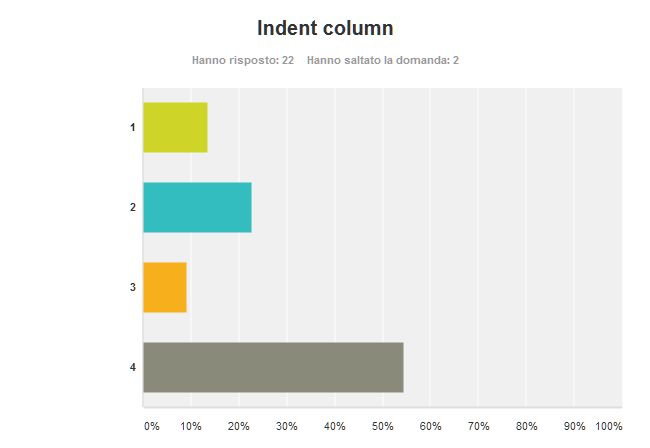
Interestingly enough – the sum of all the votes for indentation lesser than 4 is not greater than the votes for indentation 4. Surprisingly there two people love single column indent! That option was more of a joke than an option I would take seriously.
Opening Brace Position (Brace=open block symbol)
Braces are used to define blocks of instruction in many languages whose ancestry can be tracked, more or less easily, back to BCPL (even if I would have some difficulties to see such lineage in Scala). In this sense there are several styles about the placement of the opening brace. The C Language by Kernigham & Ritchie used the open brace at the end of the statement that defines what kind of block is. Allman style, used initially to write most of the BSD utilities, uses braces in the same way Pascal-like languages use begin/end, i.e. on a line alone aligned with the statement. GNU is a third popular indent style and requires the opening (and closing) brace to be on a line alone, half indented between the statement and the inner block code.
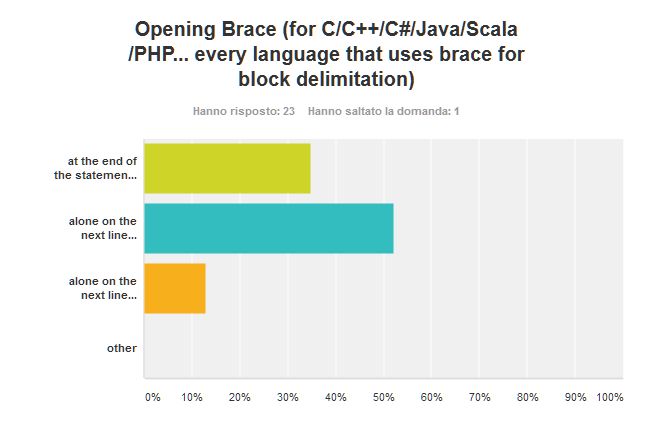
Once again my preferred style won. I like the symmetry of the matching parenthesis the helps in reading the code and hints the programmer to keep the code short because some lines have to accommodate braces. The denser the code the harder to read.
Also I think that is interesting that I changed my style – I started with K&R style (pretty obvious since I started coding C before the ANSI standard was out). Then, when switching to C++ back in the early ninenties, I read the Ellemtel Rules and Recommendation. Those rules made a lot of sense and provided rationale for every rule. So that I was convinced to switch brace style. Lesson learned, if it makes sense, you can change your habit (or religion).
The GNU style scored quite low, maybe that half indentation is not that appealing.
Language of Choice
At the beginning it was just machine code, no one could disagree. Then it came Fortran, Lisp and Cobol (but the real story is a bit more complex) and suddenly there were four religions (not three, because there were those claiming that machine code was still the best). For my poll, I picked 5 popular languages and Antani an esoteric language. (this is a mistake – the right name is Monicelli instead of Antani, sorry).

Once more surprisingly the preferred language is C++, which matches my preferences (I swear I didn’t rig the poll). With a C# second, on which I agree and third C. I am afraid that the poll group was very biased in this respect, especially when compared with official indexes such as TIOBE.
Thanks god no one chose Antani, but no one had a different preference other than the ones listed. Given the zillions of programming languages I had expected at least one vote in other.
Scripting Language of Choice
Scripting languages are the glue of the software, they allow with a moderate effort to combine components are tools to provide advanced and sometimes surprising results. The difference between a general purpose language and a scripting one may be thin in some cases and I think there is no clear answer. Python, Visual Basic, Ruby and Lua may have roots in scripting, but they aim to or are used as languages to create general purpose software.
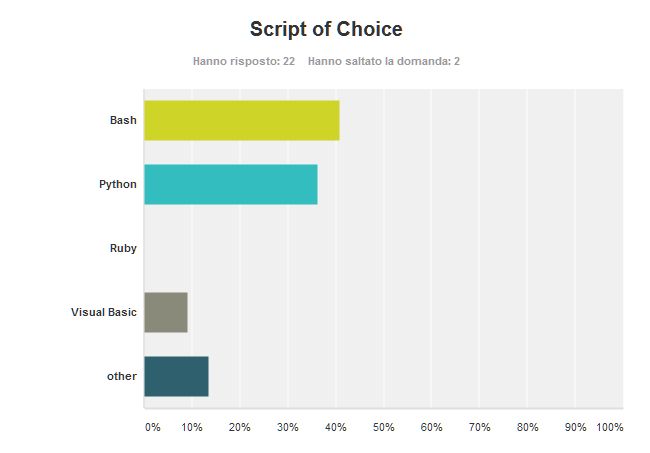
Bash is my preferred scripting language. The latest version has a number of features that allows complex programs to be written. In its evolution lost a bit of cryptic aspects letting the programmer use more sensible constructs, but it is still a language with some obscure constructs. Hardly you can beat bash in the Unix/Linux environment when you have to automate the command line. Since in Unix/Linux you can do everything from the command line, bash allows you to automate the entire system.
The shortcomings of bash, notably a survival level of math handling, the lack of user defined structured types and no native support for binary files, do not prevent the guru programmer to use bash for everything. A more convenient way is to use Python that is based on a more modern design and can rely on many and disparate libraries.
So I expected Python to collect more votes than bash (even if bash is my preferred one).
other collected 1 vote for JavaScript (which indeed is a scripting language), 1 vote for Lua (another pretty scripting language very simple although flexible) and 1 vote for Perl (another Unix/Linux favorite).
Ruby got no sympathy, although at least one noteworthy web application is written in this language.
Web Server Language
Many (most of?) applications are written today as web applications. Languages used to code these programs are to be chosen carefully, long are gone the times when a CGI interface and some shell scripts could do the trick of making web pages dynamic.
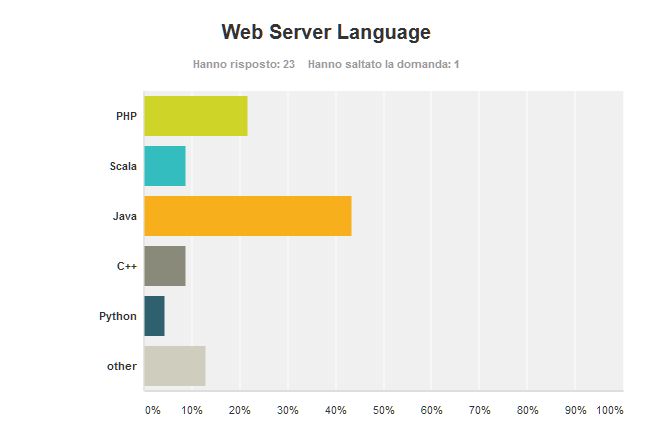
If traditional applications are to be developed in C++ according to the majority of my friends, not so for web applications. Here Java is king getting twice the votes of the runner up – PHP. PHP being specifically developed for this task is a natural second. Surprising Scala and C++ are considered at the same level for this application.
In the other section I got one vote for NodeJS, one vote for C# and one vote for no preference (so my fried who voted for no preference, next time you can program a web application in Monicelli… :-D).
IDE
The IDE is a relatively recent concept in programming, I would date it around early eighties, at least in its modern form. Before you had several different and sparse tools to do your programmer job – an editor, then a compiler, a linker and possibly a debugger (interestingly enough on home computers you had just one environment which could be considered a rudimentary form of IDE). IDE started to appear in systems with no multiprocessing capabilities such as CP/M and MS-DOS. The first I’ve seen and used, which incidentally was also the first IDE, was Turbo Pascal on the CP/M operating system.
Nowadays complex projects are preferably managed by IDE even when they come with a build system recipe (be it make, ant, maven or sbt).
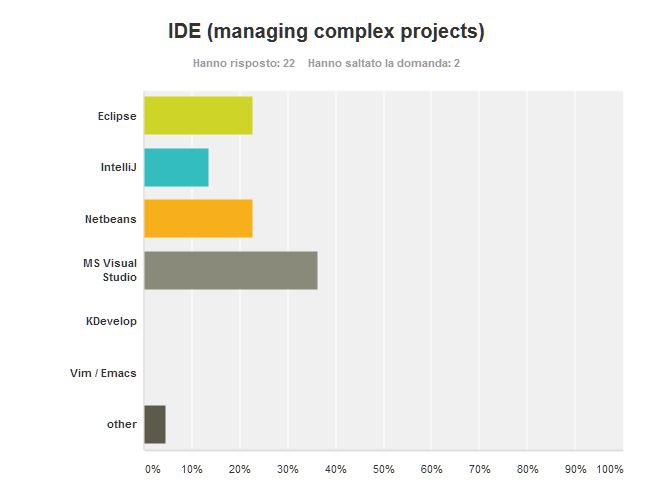
Microsoft Visual Studio is the oldest among the choice and the one who got most votes. I fully agree, Visual Studio is a powerful and comprehensive solution that long has long the lock-in-Microsoft nature it had at the beginning. When I can’t used Windows, my preferred IDE is Netbeans. On the other hand I can’t stand Eclipse. It is a bloated application with no rational design in its interface. Eclipse subsystems seem to be attached as a second thought and they don’t share the same way of using variables, or doing things. Too bad that Eclipse is the chosen platform by many vendors to implement their specific development environments. Consider NXP (former Freescale) that provides KDS to develop for their Kinetis processors. You could setup a different IDE, but you would have serious trouble in finding configuration parameters especially for the debugger.
IntelliJ is a fair alternative to Netbeans, I’ve used it for a while with Scala and I think the shortcomings of the IDE are more in attempting to understand a cumbersome language than in the IDE itself.
When writing the poll I forgot about Xcode the Apple proprietary IDE. Apple doesn’t trigger my enthusiasm, I never used XCode, but I heard it is jolly good. Though it is the only IDE in the list that works only on a proprietary hardware.
I expected some sympathy for KDevelop and Emacs (if not vim), but they got any.
Build Systems
What use is a build system today when we have such powerful IDEs? Well, first you may want to build the application in batch mode (though some IDEs support batch mode) or you don’t want to force a specific IDE on the users of your code or your IDE saves the project in a location dependent fashion (Eclipse?).
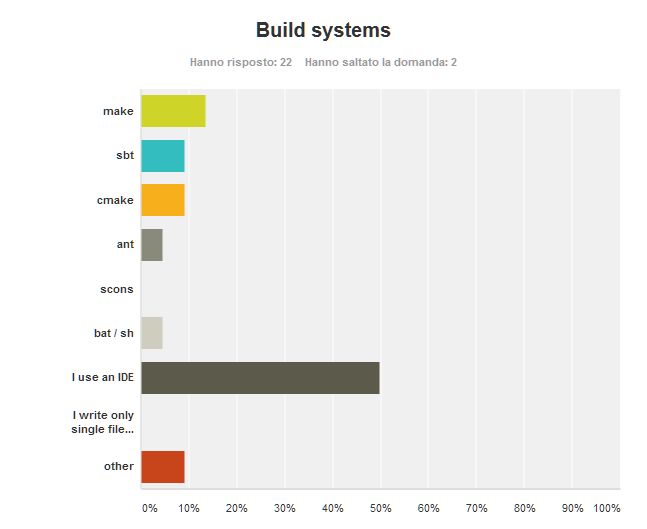
Unsurprisingly more than half of my esteemed friends and colleagues noted that using their preferred IDE they don’t need any stinking build tool. So true, but I still prefer to have something simpler if a full IDE is not needed.
Make is both the first build tool and my preferred option. Before make programs where build using shell scripts (an option that has still a supporter according to my poll). I had a look at ant when it appeared to manage the build of Java application. My impression was that ant was just a different way to write makefiles, so there was no gain in learning a different system. Cmake is somewhat similar.
Sbt is the tool for building (and managing I would say) Scala projects. It is an over-weighted tool that starts to download internet on your pc the first time you launch it. Then it relies on a repository to store and retrieve different versions of the libraries and eventually manages to build Scala applications hiding the warning messages coming from the underlying tools. As you may have guessed, I can’t stand it.
Others make me notice that I left out maven and gradle (one vote each).
Version Control System
Tenth and last question, what is your preferred version control system? A version control system is a system that takes care of the history of your source code, so it is quite an important part of the development.
In the workplace we had quite a flaming discussion over which is the version control system to use, split in half (me on one side, my colleagues on the other) we were among subversion and git supporters.
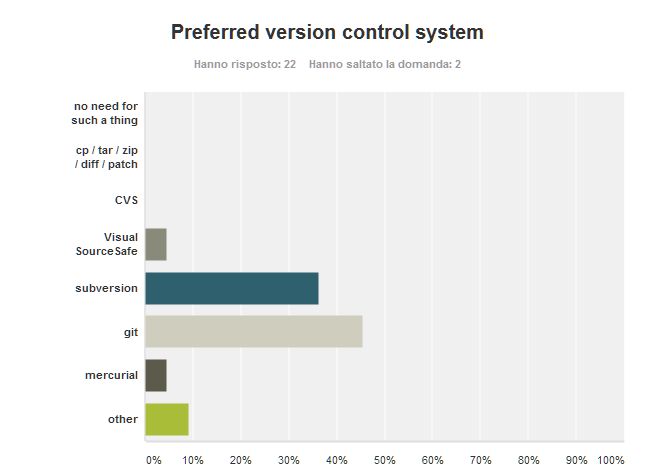
Thankfully no one in her/his right mind thinks that there is no need for such a thing as well as that this management can be done without specialized tools (i.e. using basic tools like tar, zip and the likes).
Also CVS is gone the way of the Dodo, as it should, but without taking with itself Visual SourceSafe, as it ought. Visual SourceSafe is the Microsoft attempt a VCS and the version I used was quite crappy.
Subversion and Git make most of the votes and are quite close each other with, to my grief, git leading.
I find the subversion promotes a better cooperation in the team and avoids the need for a Software Configuration Manager. You have a single central authoritative repository, with a story fixed (as fixed can be data). The team must proceed by small commits and frequent updates. If care is taken not to commit code that breaks the build, then this is a very convenient way to proceed.
Git has been written from a very different need – suppose you are a maintainer of a project. Of course you want to have control of what the contributors to the project are contributing. Maybe you want to bugs to be fixed, but not some new features, or you want to be very careful about the code written by a specific programmer. You need an easy way to add and remove single commits, merge and go back if anything is wrong.
But when you apply git to a development team you run the very high risk to have every developer with a different version of the codebase, with a central codebase out of date or not consistent because there is no such thing as a maintainer.
Nonetheless my team promised me a tenfold increase in productivity if we replace subversion with git, so I opted for the wrong tool. We are about to switch, and this could be some stuff for another post.
Anyway there are some other VCS – beside mercurial, also perforce got a single vote. I got a vote also for none at the moment.
I hope you enjoyed taking the poll and reading my comments at least as much as I enjoyed writing the poll and reading your answer. Your comments are welcome, after all this is about religions, I would be disappointed if no flaming comment would appear :-).